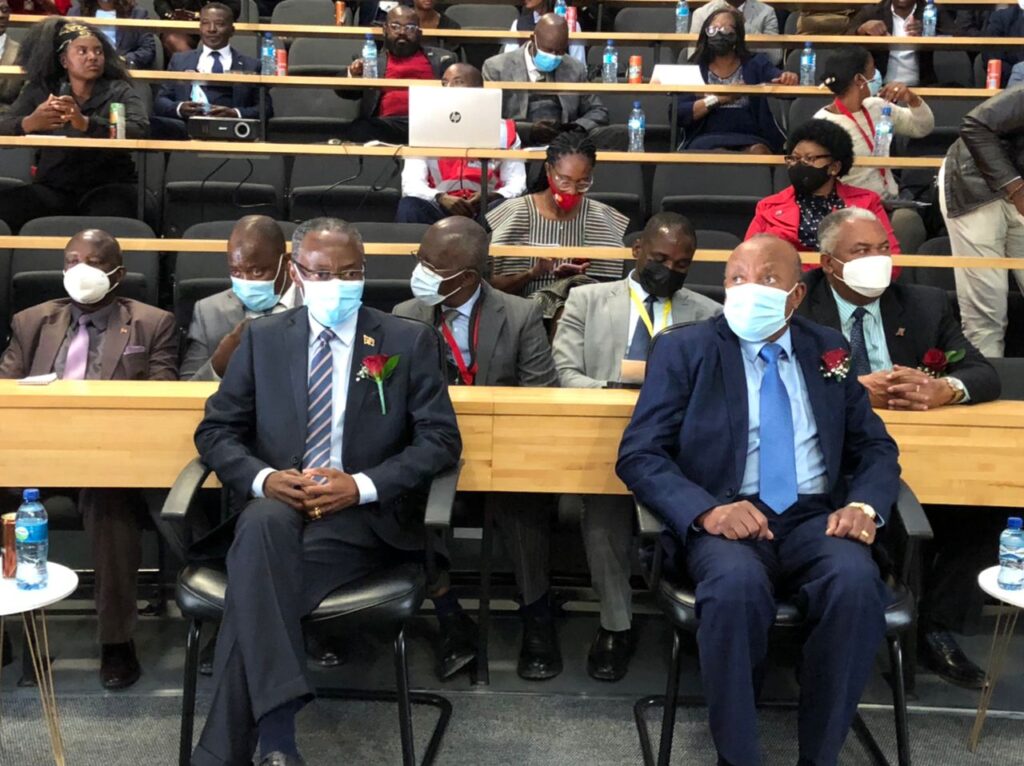
By: Eba Kandovazu
Vice President Nangolo Mbumba says some children deliberately choose to not go to school. He says the situation is worsened by parents who also do not send them to school. He says this is why many children are on the streets.
Mbumba said this during an engagement meeting with Angolan Vice President Bonita De Sousa Diogo.
He was responding to questions asked by the Oukwanyama Traditional Authority representative, who questioned why many Angolan children in Namibia are selling products instead of being in school.
Diogo also said Angola is busy building 5,000 schools to address the issues of young Angolan boys and girls selling things in the streets.
Ohangwena Governor Walde Ndevashiya also confirmed with this publication that his region is faced with the challenge of Angolan young boys and girls as street vendors.
The two Vice Presidents met up with regional and local authorities in northern Namibia, the first meeting of its kind.
The meeting was also attended by environment minister Pohamba Shifeta, information and communication technology minister Peya Mushelenga, urban and rural development minister Erastus Utoni and several Angolan ministers.
The ambassador of Namibia to Angola, Patrick Nandago, also attended the meeting with the presence of northern regional governors. The meeting was hosted at Jose Eduardo Dosantos Unam engineering campus in Ongwediva. In attendance was also the king of Ondonga Fillemon Shuumbwa, and the Chief of Uukwambi, Ndilimani Iipumbu. Mbumba, in his address, said Namibia and Angola have a good friendship.
“This is a visit of Neighbors, a visit of friends”. Nangolo said.
“We are one community, one people. We have to work together to help our people. I value the visit of my friends,” Nangolo said, revealing that the next building “wing” to be built at Jose Eduardo dos Santos engineering campus will be called Angola. He said the delegation would visit other places in the region after this meeting.
Diogo said that after the visit to Unam, he would proceed to visit the burial site of King Mandume Ndemufayo. He said Angola’s interest in the northern provinces of Namibia is to see the local authority governance structure. A lawyer by profession, Diogo said he is also a former local government minister. He says that is why he is particularly interested in local and government authorities. He explained that Namibia and Angola’s friendship dates back to the liberation struggle.
Diogo also spoke on the export of oil and usage of Angolan Fuel in Namibia, responding to a question raised by Naloba Vice President Petrus Amadhila, who asked why Namibians cannot use Angolan fuel when Business trade between the two countries already exists, saying that vendors buy food and other goodies and transport between the two countries.
He also said Angola has 1400 traditional leaders and that they are in the process of organising them. Namibia has 53, according to a presentation by Urban and rural development ministry executive director Nghidinua Daniel.
Diogo was responding to questions by Ondonga King Shuumbwa, who asked that they be connected to Angolan local authorities leaders as was done in the past. He cited the relationship between King Mandume and his Angolan counterparts.
Speaking to The Villager, Uukwambi Chief Iipumbu also stressed the importance of Angola-Nambia bilateral cooperation.
“It is a necessity because we, for example, struggle with recovering our livestock that somehow goes to Angola. If we have proper relations, it would make the recovery process easier,” he said.
The Villager also spoke to Omusati Governor Erginus Endjala, who said that today’s meeting is important in that it highlights the connection between the two countries.
“The Vice President of Angola has been here for a while, but today we are at Unam to strengthen our relationships. We should remember that Angola is a country that contributed a lot to our freedom, so it is important that we keep the relationship up. They are our true friends,” he stressed.
In attendance was also northern businessman Banda Shilimela, who, during a question and answer session, said that Namibian towns are properly managed because elected councillors are ordinary citizens, teachers and business people on the ground.
He says although their positions are part-time, they are doing a good job keeping cities and towns clean.









Comments